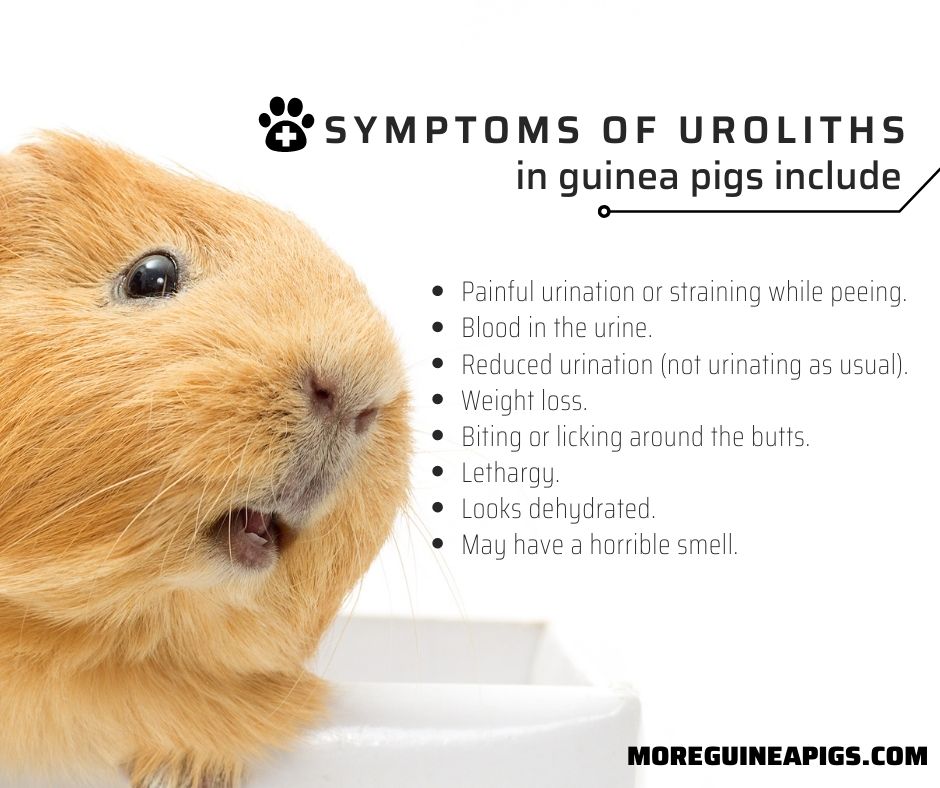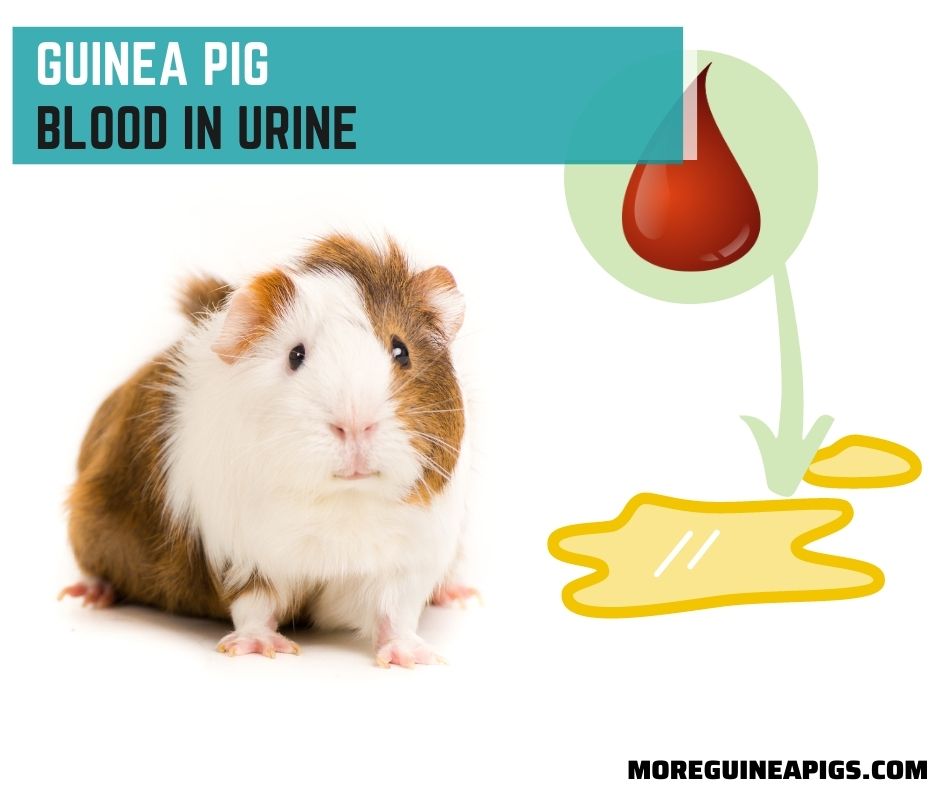6 Causes Of Guinea Pig Blood In Urine And Simple Treatment Tips
Are you noticing blood in your guinea pigs’ urine? It’s sure a thing to be alarmed, or perhaps you are just getting worried over nothing? Well, this article is going to help you understand your pet better.
Guinea pig blood in urine is a medical problem known as haematuria. It can be a symptom of any health of these issues – urinary tract infection, Pyometra, ovarian cysts, tumors, trauma, cancer, and kidney stones.
Blood in guinea pigs’ urine is a medical condition in which blood cells flow out of the urinary tract.
Since many diseases can make your guinea pigs pee blood, being able to tell the cause is critical to deciding how best to care for your guinea pigs.
On that note, this article will help you understand what a guinea pig pee looks like, why guinea pigs pee blood, what you can do to help, and how you can prevent it.
Stick around to learn more!
What Does Guinea Pig Blood In Urine Look Like?

Many cases of bloody urine reported in guinea pigs, especially by new pet owners, usually turned out to be normal guinea pig urine.
Guinea pigs commonly pee red urine after eating vegetables such as dandelions, broccoli, and cabbage. This unusual urine coloration is caused by the excretion of plant pigments in the diet. And it is nothing to worry about.
A normal guinea pig’s urine ranges in color from a pale yellow or clear color. Also, It has various shades of orange and brown, and all the way up to a deep red color.
Also, because of the presence of calcium carbonate excreted in their urine, guinea pigs’ urine may appear cloudy.
Red urine is not always a medical problem and usually returns to normal within 1 – 3 days. But in some rare cases, it can take up to 3 – 4 weeks for the urine to return to its normal pale yellow color.
Where the guinea pig truly pees blood is caused by some illness/diseases such as cystitis, sludge/stones within the urinary tract, uterine adenocarcinoma (tumors), and many more.
Besides having blood in the urine, haematuria often comes with smelly pee.
Moreover, since normal red urine can be easily misunderstood as bloody urine, when you suspect that your pet is peeing blood, the best thing to do is take the animal to the vet for proper diagnosis.
Also read: Guinea Pig Pee/Urine: Everything You Need to Know
Why Is Your Guinea Pig Peeing Blood In Urine?

If your guinea pig truly has blood in its urine, it is a result of a disease somewhere within its urogenital system.
It may be any one of these diseases: kidney stones, diabetes, bladder stones, blood clots, cancer, Pyometra, ovarian cysts, trauma to the genitals, and cystitis (especially in females).
True blood in guinea pig urine (true haematuria) is not something you can treat yourself at home. First, a vet needs to properly diagnose your pet before adequate treatment is given.
Usually, a test will be conducted to determine the cause of the bloody urine – the reason is that treatment for haematuria varies depending on its root cause.
That said, let’s understand each of these bloody urine-causing diseases in detail and how you can treat or prevent them.
Uroliths or Urinary Stones
Uroliths is a technical or medical term for kidney or bladder stones. It is one of the most common causes of bloody urine in guinea pigs.
Uroliths (urinary stones) occurs when certain minerals such as calcium clump together (precipitate) and cause blockages throughout the urinary tract, thereby causing painful urination that comes with blood in it.
Kidney stones is a disease caused by poor dieting and urine pH level. A high mineral diet causes more minerals to be excreted into the kidneys.
Several minerals excreted into the kidneys mean different pH levels, and different ph levels cause some minerals to clump together.
So for most guinea pigs that have alkaline urine, calcium stones are most common amongst them. Diets high in pellets but low in hay and a variety of vegetables are also common causes of stones in the bladder or kidney.
Another thing that increases the risk of kidney stones in guinea pigs is giving too much mineral supplementation. Other possible factors that cause uroliths are renal disease, low water intake, obesity, poor hygiene, and a lack of exercise.
Symptoms of uroliths in guinea pigs include:
- Painful urination or straining while peeing.
- Blood in the urine.
- Reduced urination (not urinating as usual).
- Weight loss.
- Biting or licking around the butts.
- Lethargy.
- Looks dehydrated.
- May have a horrible smell.

Severe uroliths are often treated through surgical operations, while mild uroliths are usually treated with pain relief and fluid therapy. But in situations where the stones have blocked the urethra, they can be flushed back into the bladder by a vet.
In a nutshell, since poor dieting or an unbalanced diet is the major cause of kidney stones in guinea pigs, ensuring you feed them the proper diet is the best way to prevent urinary stones disease.
This means feeding your piggies lots of hays and veggies with lots of water to drink. Also, ensure you provide them with lots of toys to exercise with. Refer to our Guinea Pig Feeding Guide for more information on what to feed your piggies.
Cystitis or Bladder Infection
Cystitis or bladder infection is the inflammation (swelling) of the urinary tract caused by bacterial infections.
Typically, infection-causing bacteria thrive due to dirty environments. So while cystitis (bladder infection) can result from kidney disease, blood-borne infection, and bladder stones; a dirty environment is one of the major causes.
Symptoms of cystitis are similar to kidney stones – hence to tell which disease your guinea pig is suffering from, an X-ray or urine culture will be carried out.
Treatment for cystitis involves fluid therapy to keep the kidneys working properly if the piggy is dehydrated. Pain relievers and antibiotics are also commonly used to treat cystitis. If uroliths is diagnosed as the cause, it should be treated.
To prevent your guinea pigs from getting cystitis, you must maintain a clean environment and increase their water intake. Also, follow the same methods for preventing uroliths.
Some Cancers
Cancers in the body, that affect the urinary system, can cause painful urination and blood in the urine. Other symptoms include weight loss, frequent cystitis, straining while pooping, and diseases in different body organs.
Although cancers are more common in elderly guinea pigs, younger ones too can be affected. To effectively treat cancer, a test can be carried out to determine what type of cancer (not usually done, due to the cost).
Nonetheless, treatment often includes antibiotics (only if a secondary infection is present) and surgery to remove the tumor.
Pyometra in Female Guinea Pigs

Pyometra is a medical term used to describe “pus in the uterus.” This disease occurs only in females, only non-sprayed female guinea pigs, and it is caused by bacterial infections.
Symptoms of pyometra include:
- swollen abdomen,
- red discharge in the urine that looks like bloody urine,
- discharge from the vagina, and
- reproduction issues.
- lethargy, weight loss, reduced appetite, etc.
Although antibiotics can suppress the infection to a certain degree, they are not strong enough to fight off the bacteria causing infection. Therefore, surgery to spay the guinea pig is nearly always recommended (may not be appropriate if very unwell or elderly).
Cystic Ovary Disease
This is also a female-related disease. It is non-functional, fluid-filled cysts that form spontaneously near the ovaries during the female guinea pig’s reproductive cycle, reducing fertility in females older than 15 months and potentially causing severe urinary problems.
Symptoms include an enlarged abdomen, reduced fertility, hair loss, painful urination, and a high risk of having pyometra.
The best treatment is to spay the affected female guinea pig, just as with pyometra. For permanent treatment, ovariohysterectomy or ovariectomy is required.
Tips to Prevent Blood In Urine of Guinea Pig

Blood in guinea pig urine doesn’t have one cause. Sometimes as we have seen, this can be a normal red coloration caused by diet. And sometimes, it can be true blood. If it’s just a deep-red decoloration due to diet or change in diet, it should resolve itself in a few days.
However, to prevent any disease that can cause bloody urine, ensure you optimize your husbandry by doing the following:
- make sure they’re getting the right amount of water and give them a diet rich in fiber such as hay and grasses.
- Keep them hydrated.
- Rotate vegetables – this will ensure they have varieties and a balanced diet.
- Don’t overfeed high calcium veggies.
- Exercise. Exercises for guinea pigs are synonymous with good health. Guinea pigs are active animals, and they need toys/accessories to keep them busy. Lack of adequate exercise can lead to the development of some diseases.
In Short
Guinea pigs are hardy animals that will hardly get sick. As seen from this article, almost all of these diseases that cause blood in the urine are husbandry-related issues – which means that how you care for your pet animal is very important.
Diet, as well as a clean environment, and lots of exercises are the three most important things you must never compromise in your care for them. These are the things that ensure that your piggies are fit and healthy.
Moreover, since guinea pigs are excellent at masking illness, daily check-up (handling) will enable you to detect symptoms of diseases on time.
Finally, always talk to your vet if you are worried about a change in behavior or if you notice any abnormality in your piggies.






